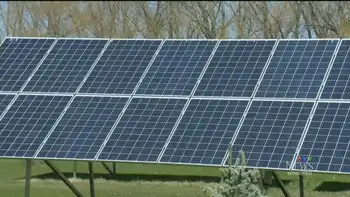Power contracts a source of regret
By Orillia Packet & Times
Arc Flash Training CSA Z462 - Electrical Safety Essentials
Our customized live online or in‑person group training can be delivered to your staff at your location.

- Live Online
- 6 hours Instructor-led
- Group Training Available
"They let on prices were going to go sky high," Heather Murdock said.
"They were so convincing, we thought, 'Holy crow, we better do something.'"
Now the Murdocks, who live in a new home on Andrew Street built by Habitat for Humanity, are paying 60% more for their electricity than if they had stuck with the Orillia Power Corporation (OPC).
Under the five-year contract signed with a Toronto-based retailer, the Murdocks pay 7.99 cents a kilowatt hour for electricity, three cents more than the five-cent regulated price currently charged by OPC and other municipal utilities across the province.
The leap in prices predicted by the private electricity salesman has not happened.
The Murdocks, who have two children, were living with Heather's parents before they moved into their new house, built as a community project.
"We are the working poor," said Heather, who works for a local household cleaning company.
"We're trying to make ends meet."
The Murdocks also signed up to buy natural gas from the same retailer.
When they got behind in their gas and electric payments, they were forced to seek emergency assistance from the Housing Resource Centre in downtown Orillia.
"Every month our bill was close to $250 to $300."
People on low incomes who get locked into paying far more for electricity than they would through the local utility can quickly get into financial trouble, said Nadine Ritchie, co-ordinator of the resource centre at 33 Mississaga St. E.
"They get into a contract and find their bills have almost doubled. It's a factor, absolutely, in payments becoming unmanageable."
Seniors on fixed incomes are particularly vulnerable to pitches about vaulting electricity costs, Ritchie said.
"They're so afraid because they're on such tight incomes to begin with."
Murdock thinks consumers need to be protected from slick sales people who arrive unbidden at their doors and make dubious claims about the electricity market, disguising exploitation as protection.
"The government should step in," he said.
"These people are taking advantage."
Two retailers, Universal Energy Corporation from Toronto and Summit Energy Management from Mississauga were fined a combined $300,000 earlier this year for making false, misleading or deceptive statements to customers.
But despite the evidence of improper business practices, contracts signed with retailers are still considered valid.
To break their contract, the Murdocks would have to pay a penalty of $500 to $1,000 dollars.
"We're still locked in," Heather Murdock said.
John Mattinson, president of the Orillia Power Corporation, said the municipally owned utility advises customers to read retail electricity contracts very carefully.
"We are aware there has been some misleading information given to some of our customers who have signed up (with retailers)."
Gus Diamantakos, owner of George's Country Restaurant on Colborne Street, said he did well buying natural gas through an energy retailer.
"I was at 28 cents when everybody else was at 42 cents."
But there have been no comparable savings with retail electricity, he said.
"My bills are almost double." Orillia city councillor Maurice McMillan says electricity prices have been regulated since 2002, eliminating the rationale to buy from retailers.
"It's like buying insurance for the moon to fall."
McMillan thinks the electricity retailers should have their licence to peddle their services door-to-door revoked, but the municipality does not have the authority to enact such a ban.
With hundreds of residential consumers in Orillia locked into retail contracts paying $30 more per 1,000 kilowatts of electricity, McMillan estimated $100,000 is being skimmed off local power customers every month.
McMillan did succeed recently in convincing council to pass a resolution asking the Ministry of Energy and Infrastructure to crack down on door-to-door retailing of electricity.
Simcoe North MPP Garfield Dunlop, whose constituency office has received many complaints about aggressive retailers, advises local residents to stay with the local electrical utility.
"At the end of the day, the Ministry of Energy may have to be more forceful with retailers and how business is done by these people," Dunlop said.











